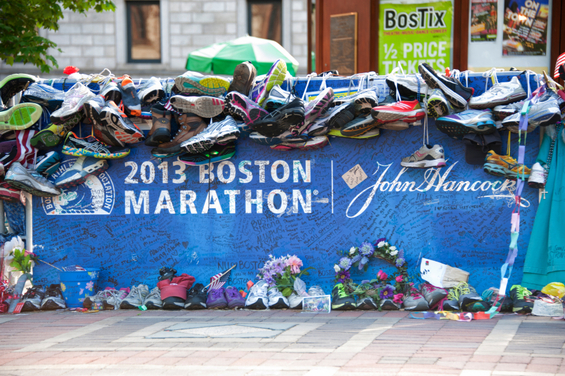This year’s Boston Marathon, and the anniversary of last year’s bombing, is during Passover—how do we feel about that?
Passover is the most widely observed Jewish holiday—more people in our community “do Jewish” in this season than any other time, including the High Holy Days. This makes Passover a “peak season” for Jewish awareness. This year the second seder will fall on the anniversary of the Boston Marathon bombing. That means for the Jewish community in Boston we are all particularly attuned to the significance and vulnerability of life—a lesson that is palpable as we read the Passover story and recall the story of our own city one year ago.
On Monday night we’ll all read from our Haggadah, our Passover liturgy. The Haggadah was brilliantly designed to serve as a bridge between the Exodus narrative and the narratives of our own lives. Passover as a whole, in fact, is an invitation to “read ourselves” into the story, and also to “read the story of Exodus” into our lives. The Haggadah reads:
“B’chol dor vador chayav adam lir’ot et atzmo k’ilu hu yatza mimitzrayim—In every generation the human being is obligated to see him or herself as having come out of Egypt/Mitzrayim.”
Your question, essentially, asks, “What do we make of the concurrence of Passover and the anniversary of this tragedy?” Every time I stumble upon this Mishnaic teaching in our Haggadah, I find myself wondering: What do we make of a tradition that reminds each of us to imagine ourselves as constantly having come out of slavery, or perhaps still needing to come out of slavery; or perhaps, at once, both?
With the concurrence of Passover and the anniversary of the bombing, the teaching of “B’chol dor vador” is an invitation to dive into our ancient narrative—a story about moving from pain and oppression to freedom and redemption. And more broadly, it is an opportunity to reflect on the responsibilities that our past—whether mythic or historical, ancient or recent—puts on the table for us. April 15, 2013, left us all with some major responsibilities, immediate and long-term.
Moments after the bombing I was on the phone with many of our interfaith partners in Boston, allies in the sacred work of pursuing social justice in our Commonweath—leaders like the Rev. Dan Smith at the First Church in Cambridge and Imam Suhaib Webb and Yusufi Vali at the Islamic Society of Boston Cultural Center. Our relationships across the Greater Boston Interfaith Organization helped our communities support one another in prayer and solidarity. My own colleagues at Temple Israel went into action to make sure that we were doing our part within the extraordinary response team that earned the motto #BostonStrong. We all did our part, from the heroic first responders on the front lines to the people thousands of miles away who sent loving emails to their Boston friends. Every single aspect of our response, as a Jewish community and beyond, reflected and continues to animate the haggadic message that we must constantly see ourselves as having come out of Egypt. We must constantly see ourselves as still having to make our way out of Egypt, out of the conditions of oppression and hatred that could result in future tragedies.
Passover is the time in which we witness our past—not as a matter of nostalgia, not even as a matter of history, that is, as the events that happened. The very word “history” doesn’t even exist in the Hebrew language. The word for the past in the Jewish tradition, the act that we are commanded to observe during Passover is zachor, or memory. History is detached and impersonal. Memory is intimate and emotional. Above all, memory generates responsibility.
On Passover 5774 we honor the memory of those who died last year in the bombing, of those whose lives have been taken throughout history by acts of hatred. Through memory we affirm our responsibility to make the world more whole, more loving and more infused with the blessing of shalom, salaam, peace.

One Fund Boston remains an active organization; consider donating in honor of the one-year anniversary of the bombing, and find stories of strength and community here.
This post has been contributed by a third party. The opinions, facts and any media content are presented solely by the author, and JewishBoston assumes no responsibility for them. Want to add your voice to the conversation? Publish your own post here. MORE

